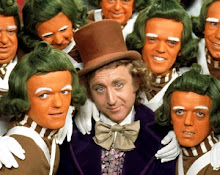Indeed marketers have been trying to collect this information for decades, however establishing such a system requires drastically overhauling the way users currently interact with websites and distribute their private data. For an exchange like this to work, it seems necessary to have demographic and use information be tracked and distributed by the web browser itself. There’s growing evidence that Google Chrome might soon be doing just that- in fact they already use a similar model through their popular email client Gmail where ads are chosen based upon keyword analysis of a users’ recent messages (a practice which continues to encounter heavy criticism due to privacy concerns). In the future, distributors like Hulu and Amazon might pay browser companies a premium for access to a users’ profile. As an incentive for giving up their private information, users could receive free access to premium content, better suggestions of products or shows, and of course fewer actual advertisements: “send us your profile to watch this program with only one commercial interruption (if you stay anonymous there will be five).”
Whatever becomes the dominant system for collecting and organizing data, there’s no arguing that the online medium is already providing valuable new feedback that companies can use to more effectively develop and market their products. At the same time, this surplus of information and predictability can be detrimental to creative innovation. A recent article in GQ “The Day the Movies Died” caused quite a commotion because it finally provides a depressingly informative explanation of what many had noticed but few really understood: “why is Hollywood putting out so many remakes lately?”
 Throughout the article, Mark Harris explains that lately Hollywood studios have largely come to rely on a single formula: pick a successful existing product and turn it into a film. Which explains why this season we will see “...four adaptations of comic books. One prequel to an adaptation of a comic book. One sequel to a sequel to a movie based on a toy...” etc. Studio executives have found that the safest strategy is to market something that’s already familiar to the audience. Apparently it has gotten to the point that even an original smash hit like “Inception” gets written off as a statistical anomaly, a mistake, a glitch in the formula. The problem with this line of reasoning is that, while safe and profitable, it cannot account for innovation and thus leads to creative stagnation. Consistency might not sound like such a tragedy if the products are tires and hamburgers, but if when it comes to things like movies, music, and games- arguably our most popular modern art forms- this halt of progress is a very troubling matter. As user profiling, prediction algorithms, and neuromarketing become more accessible and widespread, it seems that companies will face the difficult responsibility of striking a balance between safe formulas and unpredictable new ideas. We can only hope that great original content has a place in this model.
Throughout the article, Mark Harris explains that lately Hollywood studios have largely come to rely on a single formula: pick a successful existing product and turn it into a film. Which explains why this season we will see “...four adaptations of comic books. One prequel to an adaptation of a comic book. One sequel to a sequel to a movie based on a toy...” etc. Studio executives have found that the safest strategy is to market something that’s already familiar to the audience. Apparently it has gotten to the point that even an original smash hit like “Inception” gets written off as a statistical anomaly, a mistake, a glitch in the formula. The problem with this line of reasoning is that, while safe and profitable, it cannot account for innovation and thus leads to creative stagnation. Consistency might not sound like such a tragedy if the products are tires and hamburgers, but if when it comes to things like movies, music, and games- arguably our most popular modern art forms- this halt of progress is a very troubling matter. As user profiling, prediction algorithms, and neuromarketing become more accessible and widespread, it seems that companies will face the difficult responsibility of striking a balance between safe formulas and unpredictable new ideas. We can only hope that great original content has a place in this model.

